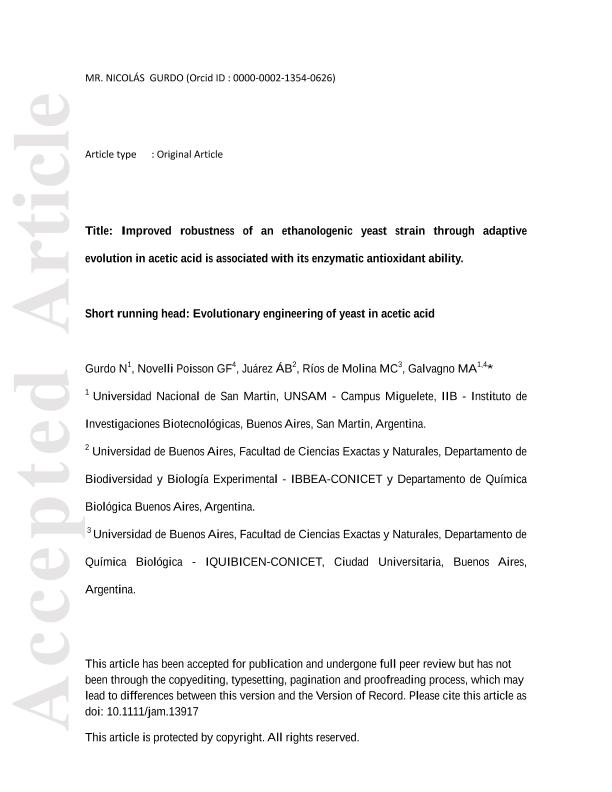Mostrar el registro sencillo del ítem
dc.contributor.author
Gurdo, Nicolás

dc.contributor.author
Novelli Poisson, Guido Fernando

dc.contributor.author
Juárez, Angela Beatriz

dc.contributor.author
Rios, Maria del Carmen

dc.contributor.author
Galvagno, Miguel Angel

dc.date.available
2020-01-08T21:51:33Z
dc.date.issued
2018-09
dc.identifier.citation
Gurdo, Nicolás; Novelli Poisson, Guido Fernando; Juárez, Angela Beatriz; Rios, Maria del Carmen; Galvagno, Miguel Angel; Improved robustness of an ethanologenic yeast strain through adaptive evolution in acetic acid is associated with its enzymatic antioxidant ability; Wiley Blackwell Publishing, Inc; Journal of Applied Microbiology; 125; 3; 9-2018; 766-776
dc.identifier.issn
1364-5072
dc.identifier.uri
http://hdl.handle.net/11336/94079
dc.description.abstract
Aims: To investigate multiple tolerance of Saccharomyces cerevisiae obtained through a laboratory strategy of adaptive evolution in acetic acid, its relation with enzymatic ROS detoxification and bioethanol 2G production. Methods and Results: After adaptive evolution in acetic acid, a clone (Y8A) was selected for its tolerance to high acetic acid concentrations (13 g l−1) in batch cultures. Y8A was resistant to multiple stresses: osmotic, thermic, oxidative, saline, ethanol, organic acid, phenolic compounds and slow freeze-thawing cycles. Also, Y8A was able to maintain redox homeostasis under oxidative stress, whereas the isogenic parental strain (Y8) could not, indicating higher basal activity levels of antioxidative enzyme Catalase (CAT) and Gluthatione S-transferase (GST) in Y8A. Y8A reached higher bioethanol levels in a fermentation medium containing up to 8 g l−1 of acetic acid when compared to parental strain Y8. Conclusions: A multiple-stress-tolerant clone was obtained using adaptive evolution in acetic acid. Stress cross-tolerance could be explained by its enzymatic antioxidative capacity, namely CAT and GST. Significance and Impact of the Study: We demonstrate that adaptive evolution used in S. cerevisiae was a useful strategy to obtain a yeast clone tolerant to multiple stresses. At the same time, our findings support the idea that tolerance to oxidative stress is the common basis for stress cotolerance, which is related to an increase in the specific enzymes CAT and GST but not in Superoxide dismutase, emphasizing the fact that detoxification of H2O2 and not O2˙ is a key condition for multiple stress tolerance in S. cerevisiae.
dc.format
application/pdf
dc.language.iso
eng
dc.publisher
Wiley Blackwell Publishing, Inc

dc.rights
info:eu-repo/semantics/openAccess
dc.rights.uri
https://creativecommons.org/licenses/by-nc-sa/2.5/ar/
dc.subject
ACETIC ACID
dc.subject
ADAPTIVE EVOLUTION
dc.subject
ANTIOXIDATIVE ENZYMES
dc.subject
BIOETHANOL 2G PRODUCTION
dc.subject
MULTIPLE TOLERANCE
dc.subject
ROBUSTNESS
dc.subject
SACCHAROMYCES CEREVISIAE
dc.subject
YEAST
dc.subject.classification
Biotecnología Industrial

dc.subject.classification
Biotecnología Industrial

dc.subject.classification
INGENIERÍAS Y TECNOLOGÍAS

dc.title
Improved robustness of an ethanologenic yeast strain through adaptive evolution in acetic acid is associated with its enzymatic antioxidant ability
dc.type
info:eu-repo/semantics/article
dc.type
info:ar-repo/semantics/artículo
dc.type
info:eu-repo/semantics/publishedVersion
dc.date.updated
2019-10-24T19:06:08Z
dc.journal.volume
125
dc.journal.number
3
dc.journal.pagination
766-776
dc.journal.pais
Reino Unido

dc.journal.ciudad
Londres
dc.description.fil
Fil: Gurdo, Nicolás. Consejo Nacional de Investigaciones Científicas y Técnicas. Centro Científico Tecnológico Conicet - La Plata. Instituto de Investigaciones Biotecnológicas. Universidad Nacional de San Martín. Instituto de Investigaciones Biotecnológicas; Argentina
dc.description.fil
Fil: Novelli Poisson, Guido Fernando. Universidad de Buenos Aires; Argentina
dc.description.fil
Fil: Juárez, Angela Beatriz. Universidad de Buenos Aires; Argentina
dc.description.fil
Fil: Rios de Molina, M.C.. Consejo Nacional de Investigaciones Científicas y Técnicas; Argentina. Consejo Nacional de Investigaciones Científicas y Técnicas. Oficina de Coordinación Administrativa Ciudad Universitaria. Instituto de Química Biológica de la Facultad de Ciencias Exactas y Naturales. Universidad de Buenos Aires. Facultad de Ciencias Exactas y Naturales. Instituto de Química Biológica de la Facultad de Ciencias Exactas y Naturales; Argentina
dc.description.fil
Fil: Galvagno, Miguel Angel. Universidad de Buenos Aires; Argentina
dc.journal.title
Journal of Applied Microbiology

dc.relation.alternativeid
info:eu-repo/semantics/altIdentifier/url/https://sfamjournals.onlinelibrary.wiley.com/doi/abs/10.1111/jam.13917
dc.relation.alternativeid
info:eu-repo/semantics/altIdentifier/doi/https://doi.org/10.1111/jam.13917
Archivos asociados
